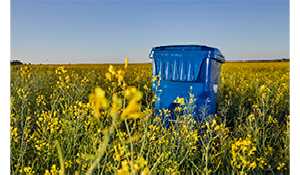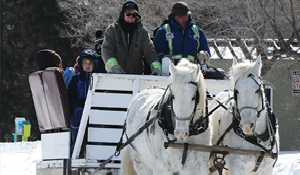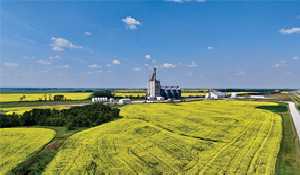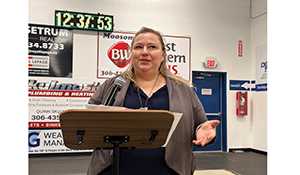World-Spectator celebrates 140 years
October 8, 2024, 1:23 pm
Ashley Bochek
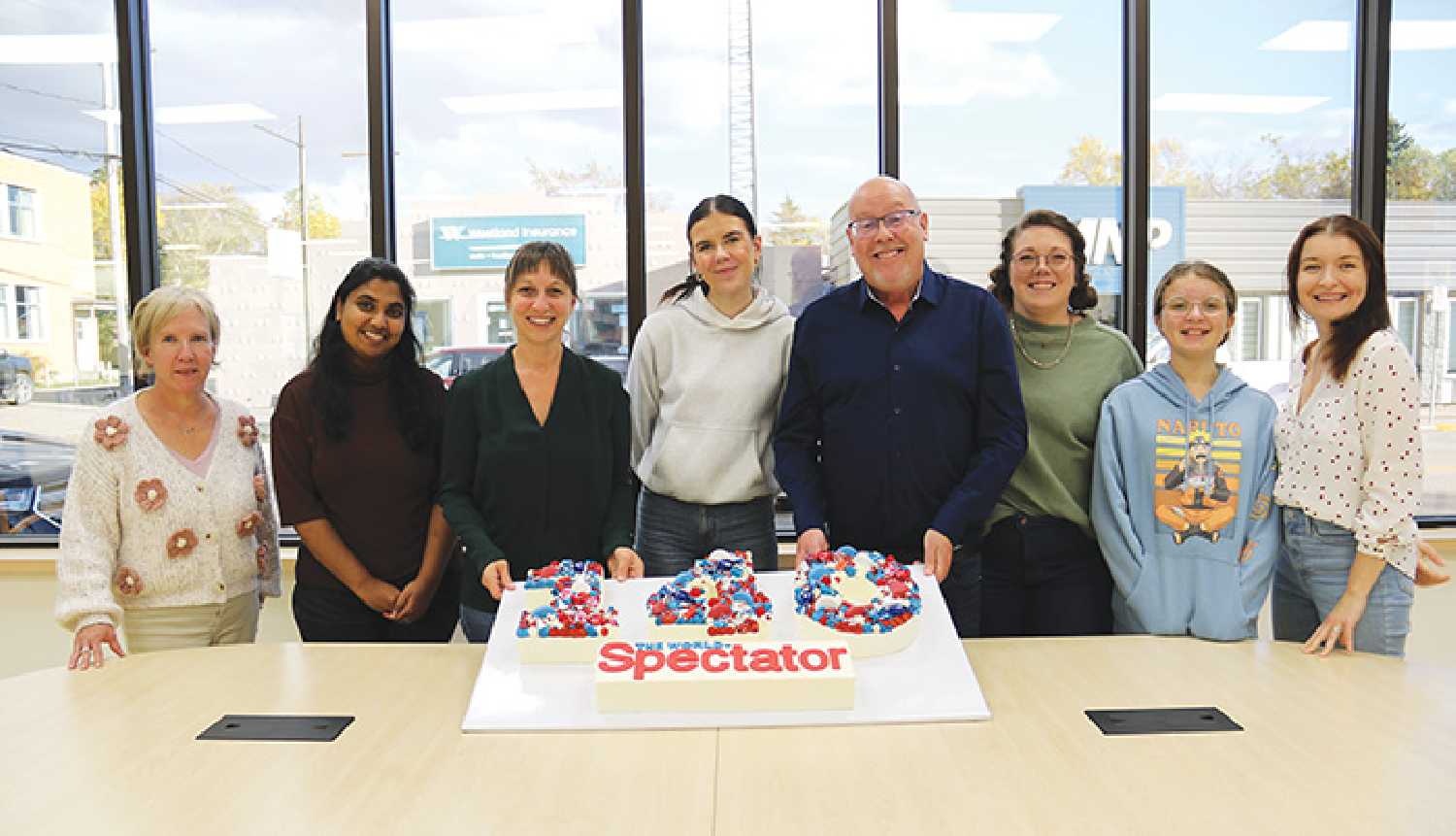

The World-Spectator celebrates its 140th year of publication this month. The paper holds a lot of history for the region, is the oldest Saskatchewan-owned business and continues to grow.
Owner and publisher Kevin Weedmark and Editor Kara Kinna say the paper continues to grow and they’re excited to celebrate many years of running a successful community paper.
“The World-Spectator started October 2, 1884. The very first issue came out 140 years ago,” Weedmark said.
“It has changed a lot over the years. It started out as the Courier in 1884, then a person named Spectator Smith bought it and changed the name to The Spectator and then a competing paper called The World come along. For quite a few years there were two papers in Moosomin, The World and The Spectator. One was more liberal, and one was more conservative and then in 1910, the two of them combined and formed the World-Spectator. The reason The World-Spectator logo is both blue and red is because it was a conservative paper and a liberal paper that came together to form it.
“The paper has always been a little bit different in the sense that it started expanding and becoming more of a regional paper in the 1940s taking in some of the neighbouring papers. There was the Welwyn Review, the Maryfield News, and the Wapella Post, then the owner of the World-Spectator started to buy those to become a bit more regional and covering more than just one town.”
Growing to cover more towns
Weedmark became the owner of the World-Spectator over 20 years ago and expanded the paper to surrounding communities.
“After I bought the business in 2002, we started expanding even farther. We started expanding to places like Esterhazy, Redvers, Kipling, and St. Lazare, Manitoba,” Weedmark said. “People in St. Lazare actually came to us and said there was a local paper closer to them that just wasn’t giving them coverage so they came to us. When I bought the paper, we were printing about 1,700 copies a week. Now, there are about 5,000 subscribers to the World-Spectator and we started the Plain & Valley a few years into running the paper. Now, Plain & Valley goes to 30,000 households every month, it’s just massive. Then, we started Ag News just a few years ago during Covid because we found that one industry that was still going strong was agriculture so I thought we would start an agriculture publication and that goes to about 10,000 households a month.”


Different approach
Weedmark says he takes a different approach to the media business than most, and has developed a formula that works in a challenging media environment.
“I own the Spectator and will remain as the publisher, but because I am running to represent this area as MLA I have turned the editor reins over to Kara and she will be running the editorial side of the business,” he said.
“The reason we keep doing is it is because number one, when I bought this paper, I didn’t come from a business background and I didn’t know a lot about business other than what I had reported on. I came from an editorial background, I was a reporter, then an editor, and my thought was I wasn’t going into business to make money, I was going into business to serve our communities.
“As soon as I bought it, I decided we would operate as community service first and a business second. We never limit the space for community news, we will add pages to make sure the stories are told.
“Last week for example, Ashley’s story on the British Home Children was an amazing story, and it took three pages of the newspaper to tell it right. A lot of papers wouldn’t take that space to tell that whole story. They just wouldn’t devote the resources to the editorial side in the same way, but I made a decision early on that our main purpose as a business is connecting our communities and serving them. The amazing thing in the media business is that when you focus on the community service first, then you get more and more readers, then from there you get more and more advertisers. Some media businesses struggle because they focus on the bottom line and cut the editorial resources that make their media important, they lose readers, they lose advertisers, they cut some more and it’s a downward spiral. I do the opposite, I invest in the editorial side, we make our product relevant, we get more readers, and we get more advertisers. In terms of sales, this business is more than five times what it was when I bought it and it continues to grow every year.
“We are a successful paper financially, and we are an award-winning paper. We just won 10 national awards. That is 10 of the 11 awards won by Saskatchewan newspapers,” Weedmark said.
Making a difference
Weedmark said that making a difference in people’s lives is the most rewarding aspect of the business.
“The main reason that we do what we do, is the difference we can make in people’s lives. I think of the Santos family who were an important part of our community but were facing deportation. We helped get the word out and helped to make sure they could stay in Canada. We rallied the community, we spoke to many people in the government, and the day we held a rally for them, they got word that they could stay.
“When my interpreter from Afghanistan was facing great danger when Kabul fell to the Taliban, I did everything I could to get him and his family safely to Canada. He protected my life in Afghanistan and he served Canada in Afghanistan and I owed it to him to protect his life. We were up against huge odds to get him and his family safely to Canada, it was a difficult process and his family’s lives were in danger the whole time, but we got them safely to Canada and now he’s contributing to our society here.
“There is case after case like that, like Viktoriia, the Grade 12 student from Wawota who came to Canada under CUAETS and was facing international student fees to go to the U of S. So the family had come to Canada, we welcomed them here, and she was facing tuition several times higher than the students she was graduating with in Wawota.”
“I talked to Viktoriia, I interviewed the Minister of Advanced Education at the time, Gord Wyant, and he told me ‘within two weeks we will have a solution.’ Two weeks to the day after that, Viktoriia, myself and Kevin Kay, the mayor of Wawota, were all invited to the legislature and the government announced that they had solved the problem.
“We see that in big ways and little ways every single week, we see we are making a difference, like when we promote a fundraiser and it’s sold out, that makes me proud.
“When Ashley wrote a story on the impact of Alzheimer’s disease on one family this summer, a thorough and beautifully written story and somebody was so moved from reading the story that they donated $100,000 to the Alzheimer’s Walk, that is phenomenal. That doesn’t happen with every media outlet. That is influencing people’s lives for the better and we do that each and every week.”
Weedmark said the newspaper’s role in the communities it serves is important. “Informing people, whether that is making sure people know about local fundraisers or making sure people know about a person in need in their community, our role is just making sure people know that and trusting the people as long as they know the issues, they are going to help. I have seen it work hundreds or thousands of times. I am proud of what we do, getting the word out, connecting our communities, and influencing lives for the better.”
Kinna says the paper feels like a responsibility to the community.
“I think the reason I keep doing what I’m doing is because the paper is such a big part of the community it serves, and by the community, I mean the region, not one town.
“It has become such a part of the daily lives of people in this area that I feel like if the paper didn’t exist it would be like letting people down. I feel like we have a responsibility to serve our community and I think people look to the paper as a community institution, so they expect us to be here.
“If there is an issue or a problem that needs to be solved, they come to us or just to tell their stories. They look to the paper as the place where the area’s stories are told. It is like they need it and they look to the paper as telling what is happening in the community and rely on us for that. I feel like the community relies on us and we don’t ever want to let them down so it is our responsibility to make sure that the community is reflected back and people can look over those pages to see what happened and feel connected to the area and have an understanding of what is going on in the area, but also having some of their history being put down on some of those pages. Important moments in the area are told. As well as fundraisers, people rely on us to get the word out, so they come to us for help. If the paper wasn’t here there are lots of things that happen in this community and I think we help with fundraisers, and stories being successful. I think that is partially why I keep doing it is a sense of responsibility to the region that we serve.”


Celebrating 140 years
Kinna says it is exciting to be celebrating 140 years.
“It feels surreal. It is strange to think this paper has been around for 140 years and over those 140 years, I think it has always been known as an excellent paper. I think it has always been a bit of a standout.”
Weedmark says the World-Spectator has always been different from other media.
“The World-Spectator has never been a typical newpaper, it’s always been different, and a bit of a leader that way. When it went daily during the Red River Rebellion in 1885, one of the owners went to the front to report. Your typical small town paper back then they would have a press and sell business cards and things like that and do a little paper once a week. Here, one of the original owners actually went to the front in the Northwest Rebellion and reported from the front. The paper actually went daily in 1885 to print as they put it, ‘the latest dispatches from the front.’ In the last couple decades, I have travelled to Afghanistan, Vietnam, Pakistan and the Philippines to report, and we have sent a reporter to Mozambique, Africa to report on development projects and we sent a reporter to Kenya to report on the Canadian Foodgrains Bank. The largest growing project for the Foodgrains Bank in Saskatchewan is between Moosomin and Rocanville, and there is also a large growing project at Kola, Manitoba in our coverage area, so we not only talk to the farmers and the volunteers who grow the food for the Foodgrains Bank, we went to see where that food goes. It’s not your typical small town paper and never has been.
“I find it interesting how different we are than the majority of the media. The vast majority of papers that were started 140 years ago are not there today. The vast majority of businesses that started 140 years ago are not there today. We are not only the oldest paper in Saskatchewan, but the oldest Saskatchewan-owned business. That tells you we have something special here. The fact that so many media at all levels seem to be struggling, but we are growing, tells you something. Not only are we celebrating our 140th year, but we are also not just surviving we are thriving. We are doing great, we are growing. When I look at the month end figures here, they are higher than last September and higher than any September ever before. When I look at our year to date financials, we have grown since last year, and last year we grew from the previous year and so on. It continues to grow and keeps expanding because we have amazing employees and the right attitude. We are not focusing on the bottom line and we are not solely here to make money, our main purpose is to serve our community, and it is working.”
Kinna adds, “That is what is cool for me too, is 140 years later the paper isn’t just going strong it is thriving and still growing, and I think that is pretty cool and unique. It is still carrying on that spirit of being brazenly and unapologetically independent.”
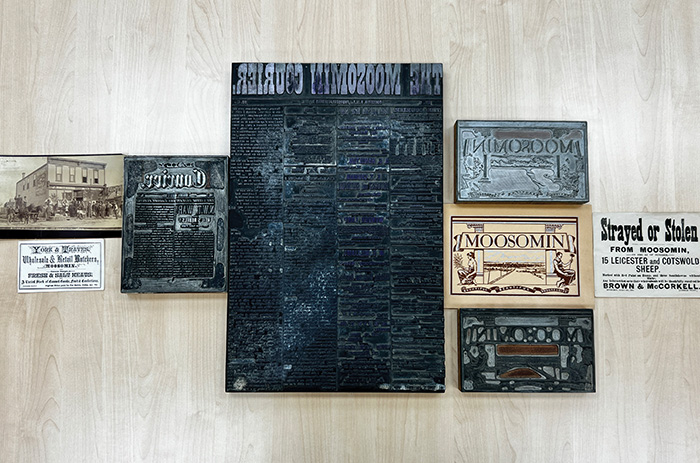

Local archive
The World-Spectator also holds some of the history of the region. “We’re not only the local newspaper, we are the local archive,” Weedmark says. “We still have some artifacts dating back to day one. We still have the prospectus from when they were setting up the business. We still have our printing plates from the very first issue, we have printing plates of the first daily issue, we have printing plates of maps of the Assiniboia District of the Northwest Territories when there were very few communities that were not on the CP main line. In a way we are the keepers of the local history, and I am proud we beat the odds. Your typical business doesn’t last 140 years. We have beat the odds, we are still growing and we have a bright future ahead of us.”
Kinna adds, “I think it also proves that there is a winning formula that there is a way you can do it that works, because obviously this paper has been working for 140 years and still is working. So, there is a winning formula. If the media takes the right approach to things, it can be successful.”
‘Supportive community, great readers, amazing staff’
Weedmark says they thank their community and staff for their success as a newspaper.
“We couldn’t have built this newspaper into what it is without incredibly supportive advertisers, a supportive community, great readers, and amazing staff,” he said.
“I had a vision of what this business could be when I bought it, and that vision has become reality, but we never would have got here by ourselves.
“We never would have got here if previous owners like Bert McKay, John Meen and Bruce and Barb Penton hadn’t built the foundation of a trusted newspaper, if they hadn’t built the World-Spectator into a community institution.
“We never would have got here without lots of talented people on staff. We have been very fortunate to have absolutely amazing people on staff. I can sit and plan all I want, but if I don’t have the people that can execute those plans effectively those plans aren’t going to go anywhere. So, we have been very fortunate to have amazing employees over the years who have helped build this business.”
Kinna says the community has been a huge part in the business’s successes.
“Part of the reason for the Spectator’s success has been the community support as well. We have a vision of what we want to do here, and the community seems to embrace and support that. So, we are extremely lucky they do that. People really love the paper, and they tell us that all of the time and they continue to encourage us to keep doing what we do.”
Weedmark adds, “We have an incredibly supportive business community, incredibly supportive advertisers, and incredibly supportive readers. We wouldn’t have reached this milestone without all of those people behind us.” Tweet
